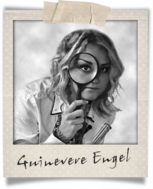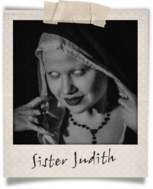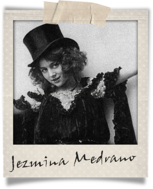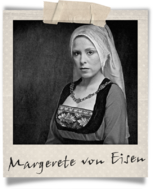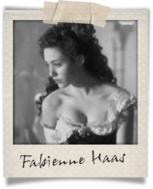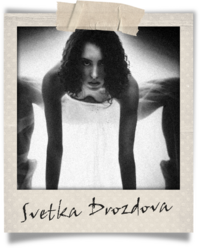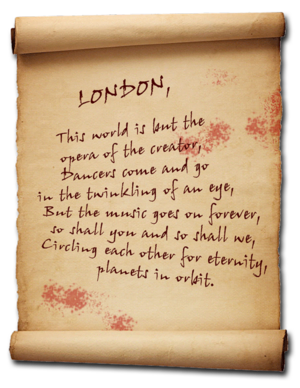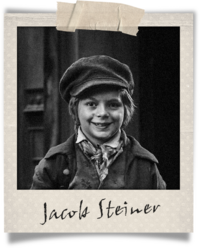2022-06-27
INVOLVED PARTIES
INCIDENT REPORT
Some Arcane Acoustics
Night falls across Vienna and the coterie starts away in their respective havens. This evening, Jezmina Medrano has climbed up out of the communal pit beneath the stage of the Birdcage Theater to find that her sister-of-sorts, Svetka, has peach blossoms woven into her hair, a manner in which she has never previously styled herself. Passing her snide sister in the dressing room, Jezmina goes to her Sire, Agrafina’s office to ask her about the goings on of late. She tells her that she’s been having problems with a stalker, and that the peach blossoms in Svetka’s hair might suggest that she is a target as well. Agrafina reminds her that someone trying to hurt either of them would be a fool indeed, as her daughters are as deadly as they are beautiful. She also tells Jezmina that the rivalry between herself and her sister is intentional, there is no better way to press them both towards greatness.
Upon confronting Svetka about the flowers, she learns that one of the staff was bringing them backstage and she took them, because who else could they be for? Besides, the poem was called London, and Jezmina was not even with the ballet when they performed in London. Jezmina warns her about the stalker, but Svetka is dismissive, implying that Jezmina simply does not know what devoted fan attention is like, since she is not worthy of the adoration like Svetka herself is.
The stolen poem reads:
London
This world is but the opera of the creator,
Dancers come and go in the twinkling of an eye,
But the music goes on forever, so shall you and so shall we,
Circling each other for eternity, planets in orbit.
Across town on the campus of the Medical College at the University of Vienna, Doctor Engel wakes up to find that a note has been slid under her office door, it is simply labeled “Engel,” the German word for angel. It is sealed with silver wax embossed with a wolf’s head seal, upon opening it, Guinevere discovers that it is indeed from her Gangrel admirer, Professor Toren Volkovich. He is letting her know that he has gone to charter a carriage for their date to the Wonder Cabinet this evening and will pick her up at midnight from At the Skull.
Upon waking in the royal apartments, Margerete finds Gruber waiting for her, as expected. This night he informs her that he has been contacted by Victoria Roth’s man of business to extend a formal invitation to meet her at Count von Richter’s estate, The Golden Messenger, at her earliest convenience. As she heads out for the evening, she comes upon a bit of a ruckus, and she finds Duke Peter von Eisenhoff, her political rival, huffing away from a man she’s seen at court, but never met before. Duke Peter is cursing the petulant man for insulting him and says that if he were of a rank worthy of being noticed by him, he would call him out for a duel. But alas, only gentlemen of the same rank duel each other, and stooping to his level would damage Peter’s standing at court.
Margerete further insults Peter and he leaves in a huff, giving her a chance to speak to the mysterious young man who was so offensive to the Duke. She discovers that his name is Rudolf Belinsky, a minor Russian noble who has been sent to the Vienna court as a liaison. He admits that he finds Vienna tiresome, but at least things are happening, and it is not as cold and desolate as his native Russia. After she bids him good evening, Margarete remarks to Gruber that this man may be useful in her schemes against Peter, since it is better to play cat’s paws than attack him directly.
In the dimly lit halls of St. Stephen’s cathedral, Sister Judith performs her nightly ritual and then happens upon young Jacob. He has been looking for her to thank her for the extra rations of stew and bread, he’s feeling much better, broken arm aside, and has a message for her from Les Mouches. He says that they have been in contact with The Pawnbroker, he has the skull of Herr Mozart and is willing to trade it for a book that a client of his wants stolen from Konstantin Koppensteiner, the taxidermist in residence to the emperor, and Keeper of Elysium. They seem to believe that he holds a book known as the Milagres da Anatomia, which is somewhere in the Wonder Cabinet, and what a better night to steal it than this, the opening of his new gallery of anatomical oddities.
Sister Judith agrees to the price and tells him that she wishes for Les Mouches to start spreading a rumor that the Small Council knows the location of Haydn’s head and they are meeting At the Skull to discuss it. She wishes for Abigale Schechter, the Tremere attaché to the council to get wind of this important information. Jacob thinks this will be no problem, he is frightened of Les Mouches, but will do this for the Sister out of gratitude. Judith puts him back to bed, but not before giving him an extra dinner roll from the food cart in the patient ward.
In her sound-proofed chamber, Fabienne Haas awakens to find her lady’s maid with a letter and armful of books sent by her friend Henri Marchande. He has written to tell her that since she requested information about the use of skulls in summoning spirits, but then did not show up to meet him, he made some notes and sent on the most pertinent information. The stack of old books now on her beside table are old and weathered, bookmarked and dogeared in places, bearing these titles:
- De Generibus Artium Magicarum
- Unaussprechlichen Kulten
- Exercitatio Magica Nobilissima
- Rational Thaumaturgy
- Liber Ivonis
The several pages following Henri’s initial letter contain many transcribed passages with citations from each book which all seem to be saying something similar, that skulls are often used in the summoning of spirits, some of the passages refer to them as “fetters” others call them “relics” or “phylacteries.” He sums up on the last page of his notes that since his specialty is in applying alchemy and hermetic principles to music, he believes that the Principle of Vibration is key here. He says, “Nothing rests; Everything moves; Everything vibrates, even the dead and other unseen things.” And suggests that perhaps what mediums and other summoners do is tune in to the vibration of the fetter, their trance like a tuning fork, helping them to find the correct pitch, in a sense. He proposes that in theory, anyone could tune in, but it would be more difficult for someone without some innate ability. His Catholic background also suggests to him that some skulls could certainly be more potent than others, such as venerated Saints.
Intrigued by his findings, Fabienne decides to pay Henri a visit, and he is most excited to see his dear old friend. She asks him about “Cassandra” and he believes that the reference might be to the Greek mythological seer and oracle. They discuss tuning into the resonance of specific skulls, and he suggests that some place with good acoustics could help increase the effectiveness of such vibrations, and that she herself, or possibly Allegria, might be able to find such a pitch with their exquisitely trained voices. When asked about the skull of Beethoven having special properties, he says he is unsure, however he knows that The Dowager was great friends with the late composer and may have more information about the whereabouts of his mortal remains.
On her way to rendezvous with her coterie, Fabienne meets a fan at a local café and slips upstairs with him at the room he rents there to perform some of his compositions. Her performance is so enrapturing that he begins to weep and in his suggestive state, she feeds on him, utilizing his passion to sway him into the sweet throes of her vampiric kiss. As he slips into the afterglow of her wiles, she suggests that he go see a composer she knows, the infamous Emmanuel Zahn, who just so happens to be her rival after she spurned a production of his years ago.
MUSIC FROM THE WIENER STAATSOPER

